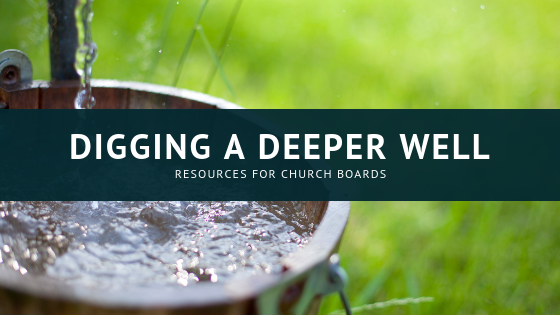… is crucial, as a church board discerns God’s activity, or as a faithful congregation discerns its way forward. Hopefully we have established that polling or surveying a congregation is among the worst of the options. But what are some wiser options for discernment? Today we offer two poems that place discernment in a different light.
In Robert Frost’s “For Once, Then, Something,” the speaker, kneeling at well-curbs, has trouble seeing beyond his own image shining on the water below. Mocked by others for “always being wrong to the light,” he persists in his well-gazing until he finally catches a glimmer of something below the surface.
For Once, Then, Something
by Robert Frost
Others taunt me with having knelt at well-curbs
Always wrong to the light, so never seeing
Deeper down in the well than where the water
Gives me back in a shining surface picture
Me myself in the summer heaven godlike
Looking out of a wreath of fern and cloud puffs.
Once, when trying with chin against a well-curb,
I discerned, as I thought, beyond the picture,
Through the picture, a something white, uncertain,
Something more of the depths—and then I lost it.
Water came to rebuke the too clear water.
One drop fell from a fern, and lo, a ripple
Shook whatever it was lay there at bottom,
Blurred it, blotted it out. What was that whiteness?
Truth? A pebble of quartz? For once, then, something.
- What is it, exactly, that others taunt the poet for doing?
- What did the poet “once, then” discern? What do you make of water coming “to rebuke the too clear water?”
- What does it mean to be “wrong to the light?” in this poem? In church board work?
- Can you talk with one another about a few times you may, as a board, have been ‘wrong to the light’ in your efforts at discernment?
Mary Oliver chooses a different approach to discernment, drawing us into a vacant lot and into prayer. But the kind of praying that opens the door not just to the church board meeting, but to deeper discernment, may make church boards feel a little vulnerable and uncomfortable. In many faith communities, we have “professionalized” holy practices like praying. “Well, you’ve been to seminary, pastor, we’ll leave the praying to you.” Oliver’s call to “just pay attention” offers a much more accessible – and useful – path into prayer for a church board tasked with discerning God’s future. And, crucially, it is a form of discernment everyone can actively share.
Praying
by Mary Oliver, from Thirst (2006)
It doesn’t have to be
the blue iris, it could be
weeds in a vacant lot, or a few
small stones; just
pay attention, then patch
a few words together and don’t try
to make them elaborate, this isn’t
a contest but the doorway
into thanks, and a silence in which
another voice may speak.
- What does the “blue iris” or “weeds in a vacant lot” have to do with praying?
- Does it help to think of prayer more as a doorway than a contest? Can you say why?
- How might “prayer as doorway” help your church board enter into discernment?








No Comments